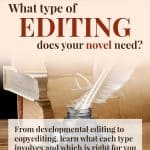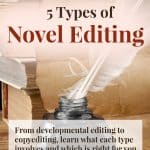What Type of Editing Do You Need?
You can learn to expertly navigate the editing process by understanding the types of editing offered by freelance editors and identifying how you can get the most out of your money without compromising on quality.
There are five common editing services, though there are variations in what they’re called and how they’re packaged. These are manuscript evaluation, developmental editing, line editing, copyediting, and proofreading.
Once you identify what will move your novel towards the vision you have for it, you can make a plan for your manuscript that fits within your budget.
This article will also show you how to use self-editing and beta reading in order to save money on the editing process regardless of what kind of editing you’re looking for.
Once you get to the point of actually finding an editor, you’ll ask for their recommendation of what your manuscript needs. But the process will be easier to navigate if you go in with an understanding of what options are out there and which are most likely to move your story in the right direction.
Manuscript Evaluation
A manuscript evaluation is the fastest and cheapest type of edit you can get.
It is also sometimes called a manuscript assessment or editorial assessment.
Manuscript evaluation is a like small-scale developmental edit. The editor will give you big-picture feedback on your story but in less detail than they would in a full developmental edit.
Who a Manuscript Evaluation Is For
Getting a manuscript evaluation can be a good start to your editing process if you have a small budget but still want big-picture feedback on your story as a whole.
If your manuscript is in its early stages and you don’t yet feel ready for a full developmental edit, you might want a manuscript evaluation now and a developmental edit later.
If you’re feeling lost and want some guidance on where to go with your manuscript but are concerned about getting overwhelmed by too much feedback, this type of editing service may be a good option for you as well.
Manuscript Evaluation before Traditional Publishing
A manuscript evaluation can be helpful if you’re working towards traditional book publishing. This is because it can increase your chances of being picked up by an agent or publisher.
Average Cost of a Manuscript Evaluation
Depending on who you choose to edit your novel, a manuscript evaluation might be in the ballpark of $.005-$.015 per word.
There can be significant variation in price based on the finer details of the editing service being offered and how much experience and training the editor has.
Developmental Editing
A developmental editor looks at your story as a whole and assesses how all the elements of your storytelling are working together.
They will give you feedback on character and plot development and narrative structure, among other things. A developmental editor will also point out any major inconsistencies that need to be addressed.
Developmental editing is also sometimes called substantive editing, content editing, or structural editing.
Developmental editors often end up doing some amount of line editing, though the edit is primarily concerned with big-picture issues.
For more information on what developmental editing can look like, check out what I offer in a developmental edit. While my page specifically talks about what I do as an editor, offerings from other editors will be very similar.
Who Developmental Editing Is For
Developmental editing is a good choice if you think there may be larger issues in your story and don’t feel ready for sentence-level editing.
Doing this type of editing first can be a good choice in the long run because any developmental issues present could require significant rewriting.
This is the last thing you want for your manuscript when you’ve paid money to polish your writing and fix mechanical errors. You want all big-picture issues to be resolved before you move on to other editing services like line editing or copyediting.
Developmental Editing before Traditional Publishing
Similarly to a manuscript evaluation, developmental editing is useful for writers pursuing a traditional publishing experience and significantly increases your chances of finding an agent or publisher.
Average Cost of a Developmental Edit
You will often pay something in the range of $.02-$.05 per word for a developmental edit. This is just an estimate, and an editor may also quote a number outside this range.
Line Editing
Line editing looks at the story line by line to improve the quality of the writing and make it flow. This type of editing helps your words communicate as you intend them to and evens out any issues in the writing that could distract readers and pull them out of the story.
Some manuscripts just need a developmental edit and a copyedit, but others benefit from a specific focus on line editing.
For more information on what a line edit can involve, you can take a look at what I do for clients during my line edits. Getting a line edit from another editor would be very similar.
Who Line Editing Is For
Line editing could be the right type of editing for you if you’re struggling to make your writing sound as good or be as engaging and effective as you want it to.
Sometimes people who don’t have formal training in writing are unsure if their writing abilities are supporting their story as well as they would like. If that’s you, consider working with a line editor.
Line editing is especially helpful for writers with a first language other than English.
Line Editing before Traditional Publishing
This type of editing service may or may not be a good choice for someone trying to get into traditional publishing.
Depending on the state of the manuscript, it could make the difference between being picked up by a publisher or not. But if your writing is already in good condition, it may be better to save your money.
Average Cost of Line Edit
A line edit could end up costing you about $.02-$.05 depending on who you work with, what they’re offering, how much experience they have, and how much work there is to do.
It could also be outside this range, especially if you want multiple rounds of this type of editing.
Copyediting
A copyeditor will read through your manuscript to identify and resolve any issues like grammar and punctuation. This type of editing is sometimes referred to as mechanical editing, and it is very detail-oriented work.
The copyediting stage of the editing process conforms your book to the guidelines of the Chicago Manual of Style. It also involves some specific areas unique to fiction.
For example, copyeditors assess your dialogue for proper punctuation and make sure the diction and vocabulary of each character makes sense for that character. A copyeditor also looks for consistency in various other aspects of the narrative.
Copyediting typically involves some line editing as well, but not to the same extent as a dedicated line edit.
You can refer to my page on copyediting to see what I include in a copyedit. It will look very similar to what other copyeditors are offering.
Who Copyediting Is For
Copyediting is an essential part of the editing process because it improves your manuscript’s clarity and readability and fixes errors that can distract readers.
This is why I recommend that all self-publishing authors get a copyedit.
There are even times that a copyeditor will catch seemingly minor contradictions or inconsistencies in your manuscript that could have damaged the plot or caused serious issues for your characters.
Copyediting is an important part of the editing process that will help readers enjoy your story even more. Some manuscripts can greatly benefit from multiple rounds of copyediting if there are a significant number of errors to begin with.
Copyediting before Traditional Publishing
As with a line edit, a copyedit can help your manuscript impress a publishing company and make it a smaller investment for them.
But publishers typically do at least one pass of copyediting themselves. They will end up having to conform the manuscript to their house style, which can involve a significant number of mechanical changes.
This means it’s often better to save your money rather than paying for copyediting before you’ve found a publisher.
Average Cost of a Copyedit
Copyediting will often be in the range of $.015-$.035 depending on the current state of your manuscript and who you’re hiring for the job. As with the other types of editing, there is a lot of variation and the cost might also be outside this range.
Proofreading
Proofreading is a final check to catch stray errors.
It isn’t technically a type of editing, but I’m including it here because it’s an important service offered by freelance editors. Some proofreaders only proofread, and some editors only edit, but it’s not uncommon to find an editor who does both.
Proofreaders are necessary because it’s impossible for a copyeditor to catch everything.
It should always be done by someone who hasn’t seen the manuscript before. You need a new set of eyes on the text or more errors will be missed.
Even a proofreader can’t catch everything. Most traditionally published books have several typos in them, though there are few enough that you’re unlikely to notice them. If the manuscript you send your proofreader isn’t very clean, there could be quite a few errors that slip through even if the proofreader does an excellent job.
Who Proofreading Is For
You’re only ready for a proofread if your manuscript has already gone through at least one round of copyediting. Otherwise there would be too many errors and you’d need to be paying copyeditor rates anyway — so you might as well just get a copyeditor.
Proofreading is an important part of the process since any error that makes it into the final book could be distracting for readers and make the novel feel less professional. The good news is that it’s less expensive than other types of editing.
Once the proofreading phase is over, the finished manuscript will be ready for formatting and publication.
Proofreading for Traditional Publishing
Proofreading happens at the very end of the process right before publication.
If you’re currently trying to land a publisher, you’re not there yet. The publisher will end up changing things during their editing process and your novel will just need to be proofread again later.
That being said, sometimes a publisher won’t have the budget for proofreading and will leave that part of the process to you. In this situation, you may want to find a freelance proofreader to make sure the quality of the finished book is up to your standards.
Average Cost for a Proofread
The cost of proofreading varies based on what proofreader you work with and how many errors are left after the copyediting stage. It might be in the area of $.01-$.025 per word.
How to Prioritize in Your Budget
In a perfect world you would be able to go through each of the five types of editing, potentially with multiple rounds of editing at each stage. But that isn’t even feasible for a publishing house.
You’ll need to prioritize the areas your manuscript needs the most help with so that you can plan your budget accordingly.
If you have a smaller budget, you can find ways to improve your novel prior to working with an editor in order to reduce the cost.
A Typical Sequence
Many books can come through the editing process in great shape from a developmental edit, a copyedit, and a proofread.
But depending on what your individual strengths and weaknesses are as a writer, you may find that a different sequence works better for you.
If Developmental Issues Are Few to None
If you’re very detailed with creating your characters and finding the perfect way to tell your story, and if you have diligently combed your novel for plot holes, you might skip developmental editing and go straight to copyediting.
Or you might substitute a manuscript evaluation instead of the developmental edit before moving on to the copyedit.
If Your Writing Is Excellent
Maybe you really struggle with the big-picture elements but your writing is impeccable, and you don’t care if readers notice some errors in your published book.
In this situation you might choose a manuscript evaluation and then a developmental edit and skip everything else.
What Never Works
You can’t have a proofread without a copyedit. This is true no matter how good your writing is.
If you try to get a proofread without copyediting first, your manuscript will have too many errors for the proofreader to do their job. They’ll end up doing what essentially amounts to a copyedit and they’ll be charging accordingly higher rates.
Additionally, proofreaders can only catch a percentage of the errors, so there will be enough errors left over that you’ll need an additional proofread afterwards in order to achieve a low number of errors in the final published book.
You also can’t skip copyediting or proofreading unless you’re okay with readers noticing errors in your novel. You can use self-editing to decrease the problem, maybe even to a significant degree, but most readers will still notice at least a few errors.
Choosing What Makes Sense for You
The possibilities mentioned above are just examples. You’ll have to carefully consider your skillset as a writer and figure out what you’re able to do on your own.
Then you can start approaching editors who offer the type of editing you’re looking for and see if their recommendations match the type of editing that you think you need.
Tips for Saving Money on Editing
If you do have a tight budget, or even if you don’t, there are a few things you can do to get the most out of the editing process and make your money go further.
The more you learn about the craft of writing a novel, the more progress you can make on your own. For example, reading my article 7 Elements of a Story could help you work on potential developmental issues and decrease the amount you may need to spend on developmental editing.
The more you can improve the manuscript by yourself, the less there will be for your editor to do and the less they will charge to bring the quality of your novel up to where you want it to be.
Self-editing and getting feedback from beta readers before you find an editor is almost always a good idea. And anything you’re able to resolve before bringing your manuscript to an editor will help you save money.
Tips for Self-Editing
Read through your manuscript as many times as you can to find and resolve as many issues as possible. It can help to focus each pass on a different problem.
For example, you can do a pass making sure the story is complete and no important scenes are missing. You can do another pass looking for any repetition or extra material that doesn’t fit the rest of the story. Or you can spend time on sentences that can be tightened up for conciseness and clarity. Other read-throughs could focus on character development, plot arcs, or looking for inconsistencies and plot holes.
I highly recommend Self-Editing for Fiction Writers by Renni Browne & Dave King. It can help you resolve big-picture problems as well as sentence-level issues, meaning that you can use its advice to reduce the cost of all types of editing.
How to Use Beta Readers
You might want to look into beta reading before you start approaching editors. It isn’t a substitute for editing since beta readers are untrained, but they can look at your novel from the perspective of a reader and give their opinions on what does or doesn’t work.
You’ll get the best results from beta reading if you give the process some structure by asking the right questions. This makes it easier for your beta readers to give you the type of feedback you’re looking for.
Objective Feedback vs. Subjective Opinion
Because beta readers are just giving their opinion rather than objective feedback based on your vision for the story, you’ll want people who read in your genre and can represent your target readership.
Often beta readers can bring major issues to your attention, though they aren’t qualified to give recommendations for resolving these issues. They also aren’t necessarily reading the story closely enough to know what solutions fit best.
If you do get recommendations from your beta readers on how to fix developmental problems, take them with a grain of salt and make sure that what they’re proposing fits the bigger picture of your story.
Final Thoughts on Editing Your Novel
You can figure out what types of editing are right for your situation by asking yourself what you need the most help with and analyzing what will fit into your budget.
Some writers choose to do several rounds of editing. Others can only afford one and must choose carefully.
Editing is often well worth investing in, especially if you’re planning to put energy into the marketing side of things and get your book in front of readers. The more editing you’re willing to invest in, the higher the quality will be of your published novel.
A good cover convinces readers to pick up the book, but good editing convinces them to stay, read it to the end, and share it with their friends.
If you’re still stuck and don’t know what type of editing you want, ask me for my recommendation. I’d be happy to help you figure out the right options for your unique situation.
Now Is a Great Time to Start Marketing Your Book
If you plan to self-publish and you’re at the editing stage, it’s a good idea to start marketing your book if you haven’t already. Authors who start early increase their sales and feel less overwhelmed by the process than authors who try to do everything at the last minute.
If marketing sounds scary, check out my article on marketing for authors where I go over the basics and provide some easy action steps to help you get started today.










